A month ago, I was drinking beer in Budapest when I hit “publish” on a post about ways I thought travelers differ from tourists, and how it all comes down to habits.
The response was overwhelming, to say the least. Scary, to be completely honest. I’ve been writing for years, often under food-related pseudonyms, so to put out my deeply-held beliefs and be both lauded and attacked under my own name was glorious and terrifying. Many of the kindest, most heart-felt, and most beautiful responses made me think of other things I wish I’d included in the original post. It’s too late to do that…but here is the follow-up.
These are more habits that I think people could adopt to be better travelers. The ones below don’t take much time, money, or effort - in fact, they can help save all three. For example, saying “yes” to opportunities actually means you don’t spend as much time planning; a “robust” climbing carabiner (useful for tons of travel-related activities, not just climbing) is often cheaper on eBay or Vinted than a new, non-climbing, poorly-made carabiner; working through why people do things differently will take some mental effort, but if you’re interested in travelling over tourism, you’re probably not averse to thinking. In fact, I daresay that if you are reading this, you are probably smarter than the average bear - and more interested in the world, and your place in it.
Some people noted that I focused on other people a lot. They said that this is fine for extroverts, but not introverts, and requested a version for them. Their observation is absolutely true; a focus on building relationships requires interacting with others, which is easier if you are extroverted, and I still think that learning about other people is a core part of good travel. I didn’t edit or modify the following habits in order to comply with requests for things introverts could do, but, on reflection, these should all be generally possible no matter where you are on the introversion scale.
So here are a few other things that tourists and travelers do differently - and why I think the traveler approach is superior.
1. Travelers say “YES.”
It was August 2007, and I was on a ferry with my friend Asim. We were on our way to Culebra, a small island off of the coast of Puerto Rico, and I was listening to an old woman sitting on the the bench next to me while Asim stood at the railing, looking out over the water. I was laughing at a joke the woman had made when Asim tapped me on the shoulder.
“Hey soooo…” he began. This was always the way he started sentences when he was about to deliver bad news, and I could feel my shoulders tense. “I heard some people talking; this is the last ferry for a few days, because a hurricane is coming through. It’s going to dock and then turn straight around. If we don’t get it back to Puerto Rico, we’ll be stuck on Culebra.”
It went unsaid that this would completely blow up all of our plans. We only had a few days before we had to get back to Cleveland for classes.
I nodded. “Sweet.”
First, he looked confused; his brow furrowed, as if he thought I hadn’t heard him. Then, I saw a flicker behind his eyes, and he smiled, then grinned. We were at the whim of nature, literally, and, because I embraced that, he did, too. And four days on a Caribbean island, trapped by a hurricane, utterly unable to contact the outside world, forced to accept whatever came our way, led to one of the most epic and amazing experiences of my life. We hung out with fishermen over breakfast, drank and danced with elderly Boricuas late into the night, swam on deserted tropical beaches, hosted a dinner party with caught and foraged food, and, when we got on a tiny plane with Laura, Sean, and a few other random people we met in the street to go back to San Juan, I was genuinely sad to say goodbye to so many friends (many of whom I am still in touch with today, and who will read this).
And that wouldn’t have been possible if I hadn’t said yes.
Tourists go into new places with set expectations, and are frustrated when things don’t match these expectations perfectly. If one room of Versailles is closed off, if one wine in a tasting flight is unavailable, if a restaurant can’t seat them at the window, they go mental and seem to be unable to process what is happening. They suffer from ossification of the itinerary, and, because their plans are so brittle, they break easily.
In contrast, when an opportunity for exploration or change appears, travelers say “yes” without hesitation. A $1 haircut from an extremely unhygenic shack, then homemade beer from the field-worker bar in a remote village in Sri Lanka? Betel nuts, hand-harvested and prepared by a man who lives alone in the hills above the tea plantations in Kerala? An eight-hour slow train because there was literally no other way to get across the mountains on a tiny budget? Yes, Yes, YES. Travelers will not only say “yes” eagerly and without hesitation, they will avoid the standard itineraries in order to make room for surprises, knowing that if they fill their lists too full of plans, inspiration will have no room to strike.
Travelers will go out of their way to put themselves in positions where adventure - and its precondition, uncertainty - is possible.
But what happens if the beer is revolting, 45 minutes of chewing betel nuts only stains your teeth red and you never feel a buzz, and the train is filthy and uncomfortable? If it’s beer, you get a fourth round; for the betel, keep chewing (it was minute 48 for me); for the train, pay attention to the experience. Better: they are all great stories. Some people will be content to say, “This is me on the deck of the cruise ship; everything went perfectly the whole week” or “I stayed in this deck chair next to this pool for so long that I got tan lines from it” or “We didn’t leave the all-inclusive resort in Mexico/Mauritius/Malaysia for a week - it was so amazing.” Imagine, instead, being able to say: “This is a me just before the entire bar decided to quiz me, in English, about the Hulk Hogan/Gawker lawsuit that I knew nothing about, and then offer their opinions on it” or “here’s the man who lives on his own in the hills; he loved betel nuts so much that his entire life was devoted to chewing and selling them, and he was so high he could only laugh” or “yeah, that was pretty much the view for eight hours.”
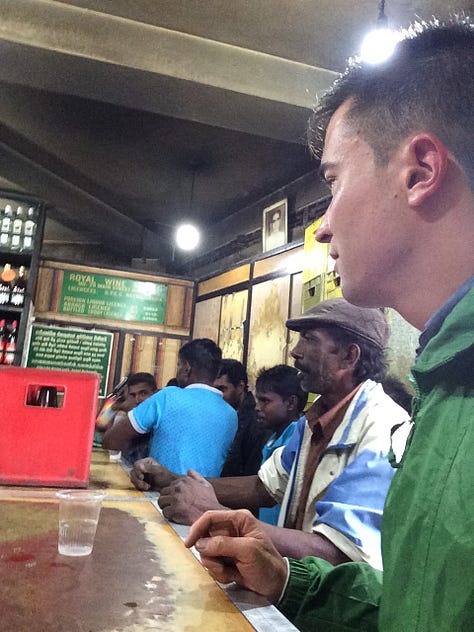
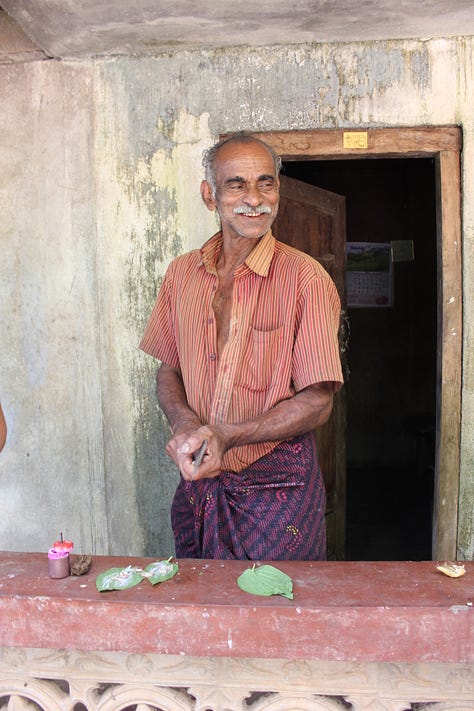
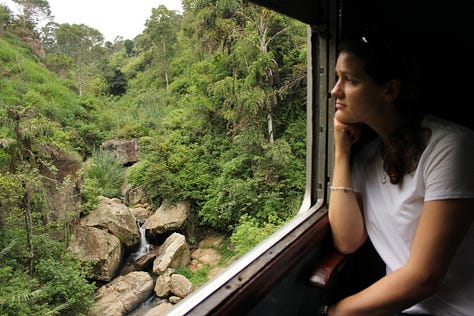
The best part about these experiences: over time, only the good will remain. You won’t remember the over-fizziness of the beer, the dirt on the leaves that got stuck in your gums, or needing to wash your clothes because they had brown stains on them from decades of buildup on the plastic sheets covering the train seats. To flip Marc Antony’s line, for memories, "The good in each experience lives after it; the evil is oft interred with its passing."
Yeah, OK - I’m not Shakespeare, and I accept that.
Tourists stick to the familiar as much as possible, to what they are guaranteed to enjoy. Travelers look for new experiences, knowing that they might find ten things average at best, but very few things will be truly terrible (fermented whale ice cream is probably in that category) and some will be absolutely extraordinary and change their lives.
Besides, when did life become about doing only what you are guaranteed to like? Why would anyone go somewhere new just to be comfortable? If you are spending your money and - infinitely more valuable - your time on a trip, embrace uncertainty and change. Say “yes.” It’s worth it.
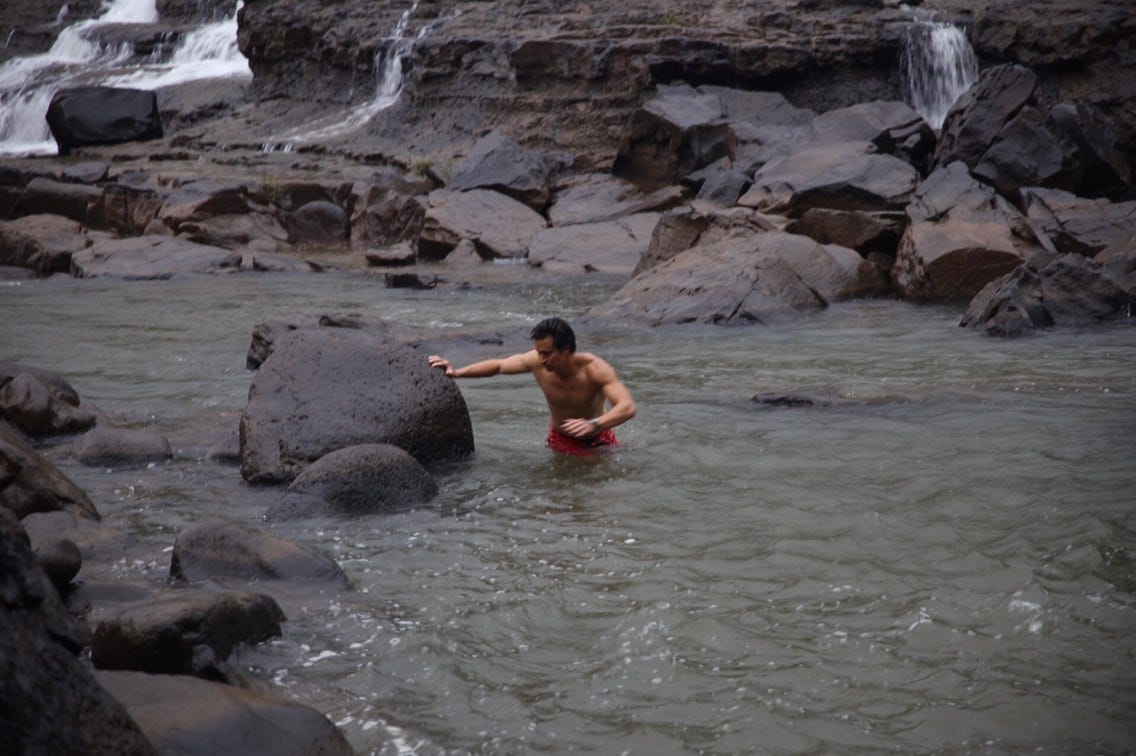
2. Travelers are interested in how other people have invented the wheel.
We were at a gym in Huế, Vietnam, and I was just finishing my workout when a skinny Vietnamese man came up to me and asked me to show him how to do some core exercises. It was a strange request, but I appreciated his desire to learn from some random guy, so I showed him some exercises. Alice and I were hungry, though, so instead of writing them down for him right then and there, I gave him my Vietnamese phone number and asked him to text me so I could send them to him with explanations.
Duc messaged me almost immediately, and I suggested that we go for coffee with Alice and his fiance. They were lovely, wonderful people - Duc was a doctor and his fiance was a teacher - and even though I half-hopedsuspected we were being groomed as potential agents in service of some international spy ring, we met up a few more times for workouts and dinners. (Sadly, it seems that their superiors didn’t think we were of high-enough value for them to try to turn us.) When we were leaving, he and his fiance bought us a Long Cam “LC1” coffee filter to bring home; they had noticed how much I loved coffee, and thought it would be a fitting parting gift. The fact that they were living on paltry government salaries and saving for a wedding made it particularly generous of them. I still use it to make coffee, and think of them every time I touch it.
If you are reading this, you probably already know about Vietnamese coffee. If not, though, and you go to Vietnam, you will see glass cups with a thin layer of dense sweetened milk in the bottom, and a small metal device on top, dripping coffee down. It is an ingenious, omnipresent, low-tech way of making shots of delicious high-octane coffee without giant Italian machines forcing steam through fine grounds at nine atmospheres of pressure.
I love Italian espresso; this is nothing against espresso machines, or Aeropresses, or Hario pourovers, or Bodum cafetieres. But tourists fly across oceans and continents to get to Hanoi or Ha Long or Ho Chi Minh City and, bleary-eyed off the plane, open Maps to look for the nearest Starbucks, ignoring an opportunity to learn how to get their fix in a different, local, way. When faced with a new way of doing things, they instead focus on how they do things at home. They will even express cloaked and benevolent indignation and feel a sense of superiority when they see people - particularly locals of a different group - doing these things differently than they are used to. They say: “Oh - we do it differently,” and then proceed to try to impose their sense of normalcy on others.
(I’m being generous by calling it tourism here; others not so kind might call it colonialism.)
Travelers, on the other hand, say, “Oh, interesting - what about this makes sense, or works here?” They actually look for different ways of doing things - making coffee, or storing eggs, or washing clothes - and then seek to understand it. They’ll try it out, knowing that they don’t have to adopt it permanently, but that they might discover a smart way to do things that never occurred to them. Why? Because they know that they can learn, they can grow, and by being curious, they might understand the world better. Plus, like saying “yes,” it opens up new worlds to them that are closed to people with more closed minds.
Travelers actually find out how other people do things, and then decide whether to change their ways.*
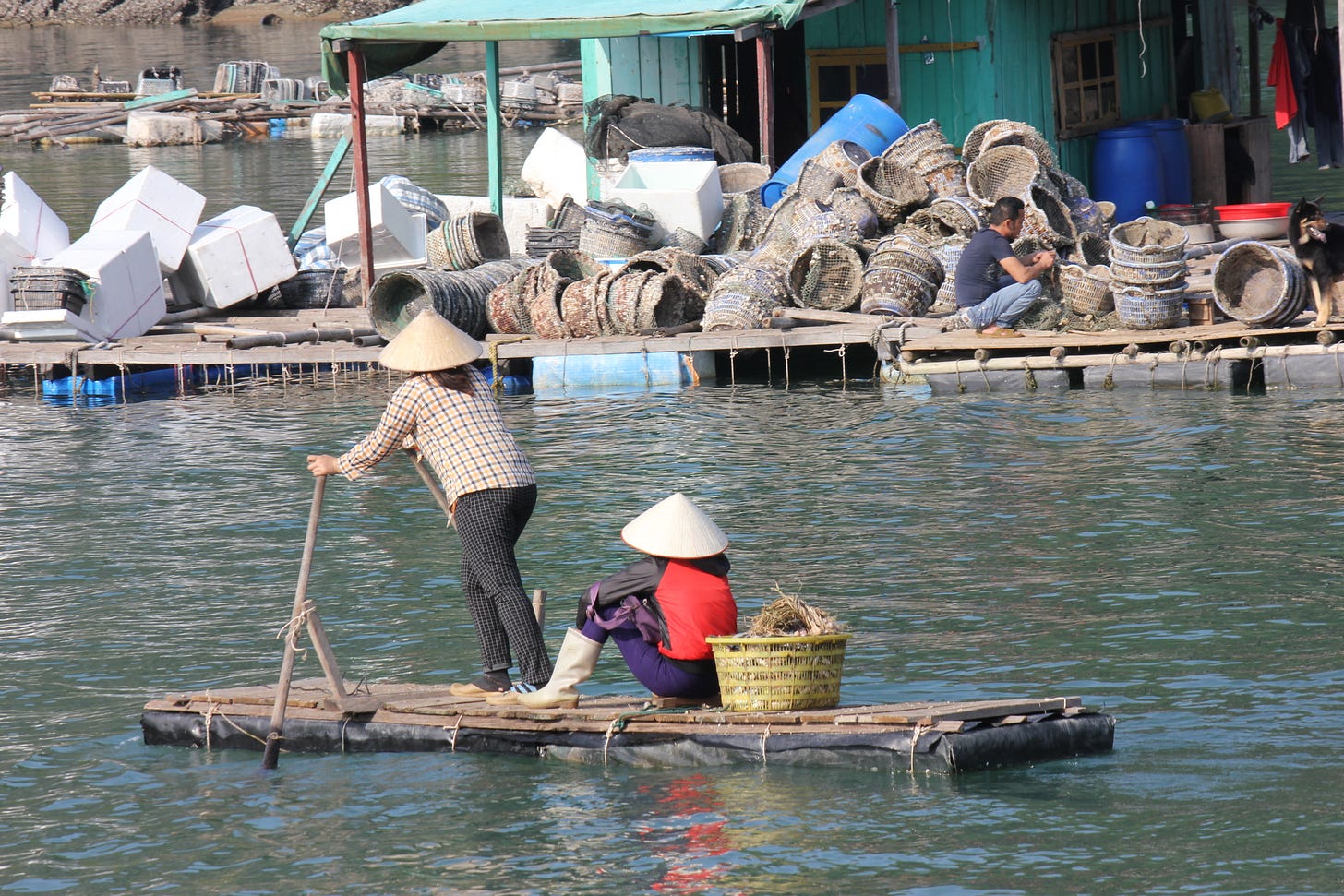
3. Travelers pack for “Robust.”
I was in Mauritius, staying with my uncle, who was one of the three wisest and canniest people I have ever met (Tom and Sunny, when you read this: you are the others).** He had some guest rooms on his property that he rented, and one of the other guests was a guy from California. I spoke to him for a while, and he mentioned that he had shipped his surfboard from Los Angeles to Port Louis just to surf for one afternoon. He wasn’t a professional; he wasn’t getting paid; he didn’t have a camera crew there to record every wave. He just wanted to bring his own surfboard.
Maybe I’m being unkind; maybe he had some sort of spiritual connection to his board, or the cost to have it shipped and insured was negligible (I know for a fact that he did not have a lot of money). But his board was fragile, and shipping it was an unnecessary expense; he also could have rented a board for a peanuts (and, from what he told me, he would have worried a lot less).
Taleb’s Antifragile is an absolutely excellent read (and I earn no money from that link). Basically, for complex organisms (like humans) and societies, the goal is not to merely survive stressors - it is to improve with them, to not be fragile but to be the opposite of fragile, to be antifragile.
One thing he points out early in the book: things, inanimate objects, generally cannot be antifragile (with the sole possibile exception of a manufactured carbon compound that seems to become stronger when put under stress). The most that a “thing” can be is “robust” - to be able to bear most shocks and come out ok.
Recently, there was a New York Times article with packing tips. They focused on how to get everything one might need for a trip into a carry-on bag.
What they didn’t focus on: the robustness of what one packs.
A lot of tourists pack what they want to pack, not what will serve them best and hold up to different situations. They pack white shirts (which stain easily and have to be washed separately from colors), fancy handbags (which broadcast disposable income to potential thieves), expensive jewelry (just ask Kim Kardashian), or surfboards, and, on return from Italy or France or South Africa, pack bottles of wine in their checked luggage (need I elaborate?).
Travelers aim for simplicity and robustness. They know that their things might get tossed around by a ground crew, rattle around an overhead bin, fall off of a boat, or suffer from any number of other potential hazards, and that they should pack to limit damage. This does not mean they go around in camouflage Cordura gear and tactical helmets, or white towels; it means that, when given the option, they will pick things that can’t be easily damaged and can perform multiple functions well.
For example: white shirts. For some reason, in Florence, tons of women were wearing white cotton button-up shirts; it was as if a memo went around on Instagram. If one’s entire wardrobe is white, and you plan on only doing things indoors, and eating bread and drinking milk, this is probably ok. If you plan on encountering anything stereotypically Italian - the gorgeous countryside, the vibrant cities, red wine, raw or cooked tomatoes - this is idiotic. A better option: anything colored. Literally anything. A blue shirt will be more robust than a white one. A grey or black shirt: even better. White? White textiles should never go in your bag.°
My wife actually sees this in a different way that is helpful here: she aims to “limit liabilities.” For example, if a city (Stockholm, I’m looking at you) is generally cash-free, it is a liability to bring out one’s phone, Apple Watch loaded with Wallet, and a physical wallet with credit and debit cards. Redundancy can be good, but this is too much redundancy, and the possibility of either losing something or having it stolen (even in Stockholm) is an unnecessary risk. Because we use phones for communication and directions, and they are generally charged, leaving a wallet behind is generally the smart choice for her - it limits her liabilities, and is a good way to become more robust.
Having written all of this: I struggle, sometimesoften, with this. I love fountain pens, for example, and have learned the hard way that I need to pack a fountain pen, a bottle of ink (a glass bottle of permanent ink is the epitome of fragile and idiotic), a pad of paper (preferably 100 gsm, laid), and at least one stick of sealing wax (often three) in order to write letters (which I still do, ferociously). Fountain pens do not react well to air pressure changes in cabins; while I have never had a bottle of ink break on me, I am fully aware that this could be a complete disaster for my wardrobe (as I don’t often wear black). Also, a recent trip saw me coming home with a bone domino set in a dovetail box from the 1800s ($2 in a flea market), a handmade wooden chess set from the early 1900s (the man wanted to give it to my son; he finally agreed to take $7 for it), nine cutting boards (long story), three antique communist cabbage graters (longer story), and - sigh - a litre of wine (packed in an aluminum SIGG bottle, not glass…but still a potential liability).
(I am large, I contain multitudes.)
For a while, Hermès - the fancy French brand - had a motto: luxury is that which can be repaired. That implied that luxurious items could also be damaged or broken, then fixed. I’d say that is the epitome of travel packing: things that are good enough to be repairable (as long as the things are not actually Hermès).
Travelers pack things that can take some scars and, if necessary, be repaired.
4. Travelers drive, and walk, on the correct side of the road.
If you are driving in the USA, you keep your car on the right side of the road. Probably as a consequence of this, people walking in America also tend to stay on the right side of the sidewalk. In the UK? Left and left. In British tourist centers (centres) like London and Edinburgh, there are signs in a lot of places to remind people to keep left, but a lot of people from the Americas or Europe still habitually walk on the right. (This causes all manners of passive-aggressive glares and mutters.)
A comment on the original post basically said that because the writer paid a lot of money to go somewhere, she didn’t see why she needed to change her behavior; the people in her destination should be thankful she was bringing her tourist money and spending it in their location. It was one of those times where I thought: she will never get it. There is no better way to indicate that you should be denied a passport than by stubbornly insisting that, because you spend money, you get to do what you want wherever you go. “I paid for it; I get to break it” works in china shops, but not in communities.
A traveler will adjust their behavior - or behaviour - to their location instead of stubbornly insisting on doing things the way they do them at home. This doesn’t mean fundamentally changing who you are or what you believe in order to fit in - you don’t need to become Hindu in India, or adopt Xi Jinping thought in China. Externally, though, a traveler will pay attention to the subtle cultural differences that exist and not insist that they are wrong or idiotic and that their own ways are superior. By doing this, at best, you blend in; at worst, you don’t offend.
And if you don’t adjust your behavior, or behaviour, you very well might crash.
*A possibly apocryphal story (I can’t find support for it anywhere) that I heard when living in Portland, Oregon: a woman went to India and fell in love with the spiced tea that everyone seemed to serve. She brought it back to America, started a small company to make it, and immediately try to sell the company to Starbucks. Starbucks declined – they said that they only sold coffee. Her chai company became an almost-overnight success, and later, when Starbucks decided they wanted to buy it, they had to pay many multiples of what they would have paid if they just bought it at the beginning. Sometimes, learning how other people do things - like making flavored tea - can literally pay off.
°Another point: if you are fragile, you are less likely to do things that are interesting. If something can break, or be stained, you will avoid things that can break or stain them. This has a mental weight that I wish I could quantify. I am neither Shakespeare nor Kahneman. These are my crosses to bear.
**Once, in a tax class I took, the professor was talking about methods to avoid paying taxes, and he mentioned that if you are a non-Indian investing in Indian countries, and you wanted to pull your money out of the investment and the country, the capital gains tax was something like 85%. He said that the sole exception was, strangely, for Mauritian entities. You could set up a company in Mauritius, then invest directly in India; when you tried to pull your money out, it would only be taxed at 15%, which was the same capital gains rate as Indians paid. It was a ridiculous loophole designed for rich people who had the ability to pay a lawyer and accountant in Mauritius to do the paperwork.
My uncle happened to be a well-connected lawyer and accountant in Mauritius; his firms would have been major beneficiaries of this law. A few weeks later, over Christmas break in London, I saw him. I explained what I understood of the laws, and he smiled.
It was all the encouragement I needed.
“Did you set that up?” I said.
“Of course!” he said, and we laughed, and he told me all about it - I think I was the only person in the family to both understand and appreciate his curious abilities. He was like Meyer Wolfsheim: the kind of person who was ambitious enough to imagine huge deals, and smart enough to pull them off - even deals that altered international investing laws. He just died a few weeks ago, and he will be missed.






1. I attended a conference in Puerto Rico and opted to stay at a cheap Air Bnb bc I couldn't afford the conference resort hotel. I had amazing adventures getting fingered in the ocean and eating roadside food with glam rock star/phd candidate I met on Tinder. The conference was supposedly about decolonizing sex education in the most colonial way possible. I felt weird hanging out of the resort when I saw how much the local people were struggling. often it is poverty and lack of organizational that's led me to have the traveler experience but I'll take it.
2. Robustness: this is a specifically female problem, but I foolishly packed all light color underwear on this most recent trip. I also ended up investing in a travel size black "splash blanket" that pulls up into a little carrying case to make the perfect travel pillow. I don't even know why bother buying light colored clothing ever 😂
This was very interesting to read! Your writing style is great!